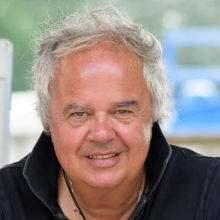Let’s talk about you: what is your background, what do you teach, and what are your research interests?
I am from Treviso, I graduated in industrial chemistry here at Ca' Foscari in 1989. I teach chemical and biochemical plants and processes, applied to the environmental field. Mainly, the courses cover basic plant engineering, i.e. basic operations (fluid transport, distillation, filtration, absorption, etc.) and advanced water purification and waste treatment processes.
What was your academic career?
I graduated in industrial chemistry here at Ca' Foscari, then laboratory technician for a few years, researcher in chemical plants, associate and finally full professor.
What are your professional references?
The rationale that has always motivated my research has been to include innovative approaches in process engineering, following the approach that the European community itself, on the basis of international research, has wanted to pursue. Basically, a progressive shift from the concept of simple treatment of secondary wastewater to that of exploitation. For water, for instance, this means upgrading from treatment to purification, in order to return a matrix to the environment in the same condition in which it was obtained. At the same time, a resource-conserving logic, which exploits the carbon and nutrients removed from waste matrices (biofuels, biopolymers, etc.).
What were your greatest professional satisfactions?
On the one hand, the feedback I have had internationally of what I have studied in my research, and on the other, being able to directly full-scale the results of my research carried out on a pilot scale. Many purification plants in Italy currently have components inside them that have been studied and developed by our research group, or at least studied at an application level.
Which is the area you have always wanted to be involved in but have not yet had the opportunity to explore?
Definitely new materials obtained from waste matrices. This is an area that I have only been investigating for a few years. The main example is short-chain fatty acids, which can certainly be considered a zero-cost, zero-impact platform chemical for the production of high added-value compounds. Polyhydroxyalkanoates (PHAs), alone or in mixtures, for making new plastics and composites, to significantly reduce the share obtained from fossil carbon. And finally, hydrogen, from biological sources, which seems to be increasingly considered an important alternative in the landscape of green fuels.
What is the aspect of your research you are most passionate about?
The practical nature of research lines I follow, the potential for direct transfer to full scale. The fact that I always operate on a large pilot scale has the advantage of obtaining directly scalable results, and therefore developing ready-to-use know-how.
Have you always known that this was going to be your path?
Initially, I didn't, but as time went by I realised I could make a real contribution in this field, so I think I made the right choices. You only realise these things when you work in the field, for appropriate periods of time.
What do teaching and researching mean to you?
The best job I could have hoped for. Managing my own time, combined with the fact that I can actually contribute both to teaching and to the efficiency of environmental management, is certainly the meaning behind my decision to embark on this journey. I would like to add one more thing, which has always been fundamental to me. The fact of working on pilot plants and on a full scale, even at a professional level, makes it possible to convey to the students a more appropriate 'feeling' of what they have to expect in the job market ahead of them. Practicality is a much appreciated element in all my courses, both bachelor and master. I believe that close interaction with the local area is a great added value.
Can you offer any advice to researchers in the early stages of their career?
Never stop asking questions and looking for answers. Curiosity has always been the driving force behind our work. Without a constant need to know, you don't get the drive you need to turn your passion into a simple job. And in these areas, we definitely need passion, not just routine work.

